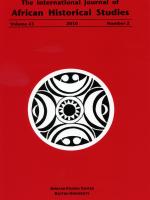Questioning the concept of post-slavery
Slavery continues to make headlines in reference to a range of Africa-related newsitems, ranging from ex-Boko Haram and human trafficking in Nigeria to anti-slavery activism in Mauritania. This special issue of the peer reviewed Journal of African History focuses on the usefulness of the concept of ‘post-slavery’, to describe legacies of historical forms of internal African slavery in contemporary Africa.
Lotte Pelckmans’ theoretical contribution problematizes the concept of post-slavery for its linearity and instead introduces the concepts of ‘fields’ and ‘stereostyles’ to slavery studies. Both concepts are tools to sharpen our analytical focus on embodied rather than discursive memories of the history of internal slavery in Africa. The argument is sustained with empirical case material from Mali.
The article introduces the notion of ‘fields’ in order to analytically distinguish between memories of internal African slavery and other structural contexts of domination and hierarchy. It creates analytical room for bringing legacies of slavery in relation to other structural hierarchies resulting from racialization, neo-liberal economies, governance of migration, and religious spheres of influence. The possibility of interrelating these different ‘fields’ makes it possible to analyze structural inequalities as outcomes of both legacies of past slavery as well as of other forms of hierarchy in contemporary societies.
A second argument in the article is about privileging embodied rather than discursive memories of past slavery in contemporary societies. To do this, the concept of ‘stereostyles’ is introduced to direct our analytical gaze to embodied actions and interactions, rather than speech, because memories of slavery are hardly ever expressed in words, but all the more so in bodylanguage and conventions. This focus allows for analyzing micro-level embodiment and behavioral continuities linked to past-slavery that are recycled to preserve, defend, or reinvent social honor and status in contemporary ‘post-slavery’ contexts.

